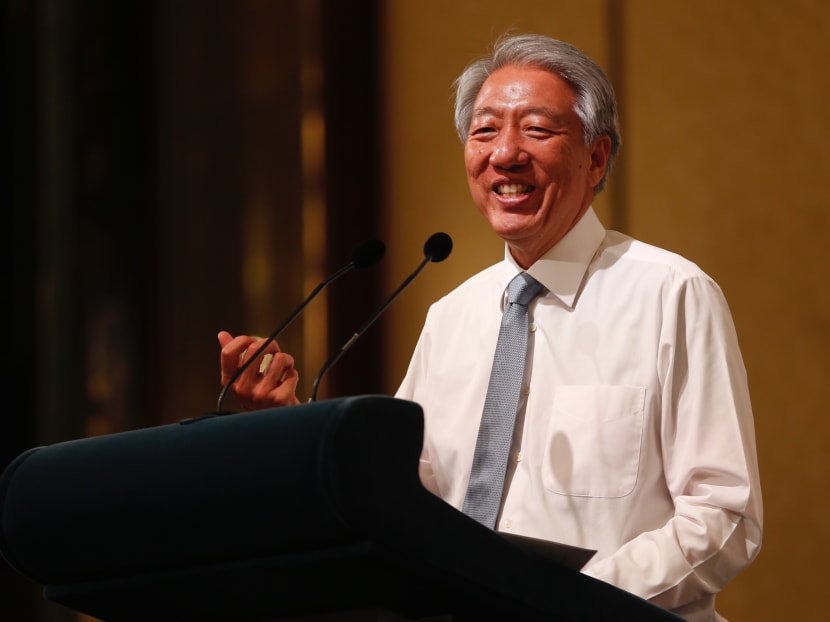Question orthodoxy and step beyond work scope, DPM Teo urges public servants
SINGAPORE — Civil servants should not be afraid to question orthodoxy and government agencies should be willing to step up in areas not traditionally within their work scope, if it means serving the public better, said Deputy Prime Minister Teo Chee Hean on Wednesday (Nov 8).

Deputy Prime Minister Teo Chee Hean who was speaking at the Public Service Leadership Dinner held at the Shangri-La Hotel on Wednesday (Nov 8) said countries are facing new threats such as cybersecurity and fake news. Photo: Najeer Yusof/TODAY
SINGAPORE — Civil servants should not be afraid to question orthodoxy and government agencies should be willing to step up in areas not traditionally within their work scope, if it means serving the public better, said Deputy Prime Minister Teo Chee Hean on Wednesday (Nov 8).
Addressing more than 600 guests at the Public Service Leadership Dinner held at the Shangri-La Hotel, Mr Teo, who is also the Minister-in-charge of the Civil Service, said countries are facing new threats such as cybersecurity and fake news. Some threats have only recently been recognised.
He “never expected that the Economist magazine would proclaim in large font on its cover “Social media’s threat to democracy””, he said. “Just a year ago, anyone who suggested that the social media was a threat to democracy, rather than an unmitigated boon and fundamental to its proper functioning, would have been castigated in its pages,” said Mr Teo.
“But this problem is now upon us, and better that it is recognised before the unfettered propagation of fake news and extremist ideologies causes more serious damage to our societies.”
Urging civil servants to question orthodoxy, Mr Teo said the public service should “have the ability and confidence to come up with new and innovative strategies and solutions based on sound analysis and facts, contextualised to our own situation”.
Civil servants should also put the needs of customers first and pool their resources together, a task that can be improved by the use of technology.
For example, the Smart Nation & Digital Government Office has been working with agencies such as the Ministry of Health to speed up the adoption of technology solutions in a wide range of services.
“But each agency also has to critically examine its own processes, map out its digital strategy and prepare your employees to be ready and more data-savvy,” said Mr Teo.
Government agencies can be the first to step up to tackle an issue, even if they might not be normally responsible for the outcome, he added.
Instead of simply issuing offenders summons for high-rise littering, National Environment Agency officers from the South West Regional Office carry out home visits to see if assistance is needed. They will then work with other agencies such as the Social Service Office to help the individual.
“While this obviously goes beyond their traditional scope, this is what the resident truly needs. The littering is just a symptom of the resident’s issues. If we can help resolve the resident’s issues and address some of them, perhaps we will have addressed the root cause of the littering,” said Mr Teo.
“We have to hone our instincts to work together better. We need to have a more complete, up to date and multi-agency-view of what is going on.”
The execution of policies is important, he added. “Policy does not stop when execution starts.”
While there will often be some trade-offs, the public service should be prepared to move forward, engage various stakeholders and explain the reasons behind why policies are enacted, Mr Teo said.
This applies to all matters – major decisions such as a new port or MRT line to invest in the Republic’s future, or measures to make daily life more pleasant.
Attendees of the dinner included officers on the Public Service Leadership Programme (PSLP). About 100 officers were appointed this year, bringing the programme’s officers to more than 800. The officers work for both ministries and statutory boards.
The PSLP, launched in 2013, aims to develop officers for key positions in five sectors — economy building, infrastructure and environment, security, social, and central administration. Under the programme, officers are groomed to become specialist leaders with an in-depth knowledge of their fields.








